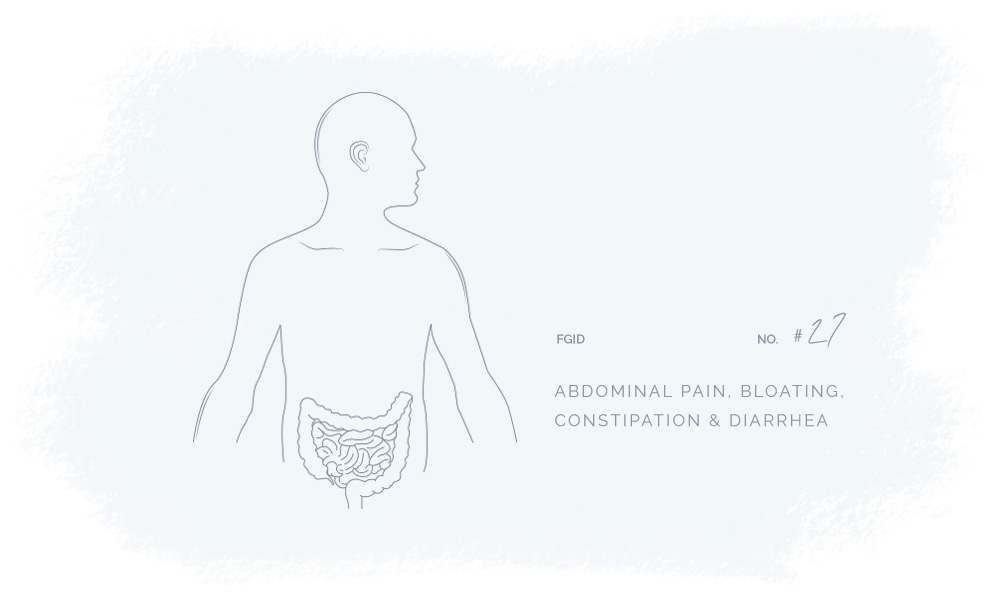Functional Gastrointestinal Disorders
Category
Digestive
REVIEWED BY
Our Biomedical Scientist
Reviewed based on
Literature Discussion & Clinical Trials
Last update
September 2020

What is FGID
Functional Gastrointestinal Disorders (FGID) are a common group of gastrointestinal disorders that lead to abdominal pain, bloating, constipation, diarrhea, etc.1
It is a complex but common group of diseases that interfere with everyday activities and quality of life as the symptoms can be severe. 2
Symptoms
Symptoms of FGID can vary to a great extent. The most common symptoms are:2
- Feeling exceptionally full after a meal
- Little appetite/feeling full too quickly
- Epigastric pain or burning – discomfort right below the ribs
Cause
Most commonly, morphologic and physiological abnormalities are used to diagnose FGIDs. These abnormalities can include a combination of motility disturbance, visceral hypersensitivity, altered mucosal and immune function, altered gut microbiota, and altered central nervous system processing.3
The connection between Cannabinoids & Functional Gastro-Intestinal Disorders
Studies find that CBD and THC may have great therapeutic potential and may be used to help treat FGID. CBD and THC are well-known cannabinoids, however, they do not have the same psychoactive effects. THC is psychoactive while CBD does not possess psychoactive effects. According to WHO guidelines, the cannabidiol CBD is generally well tolerated with a good safety profile.
Preclinical evidence proposes that the cannabinoids THC, CBD, CBG, and THCV may be therapeutic in the treatment of functional gastrointestinal disorders as the endocannabinoid system may be involved in the function of the gastrointestinal tract and the regulation of bowel movement.4
The literature discussion is an overview of the published results from scientific studies investigating if and how cannabinoids can be beneficial in the treatment of FGID. The overview will be updated regularly to ensure the newest and most accurate information.
Endocannabinoids may play a role in in the central nervous systems
intracerebrovascular application of anandamide and 2AG may exhibit gastroprotective effects in ethanol-induced ulcers, proposing that endocannabinoids play a role in the central nervous system.5
Cannabinoid receptors may be involved in pain and inflammation treatment
TRP receptors (TRPV1-4, TRPA1, TRPM8) are involved in pain sensation but may also play a role in inflammation. It was shown that there is an interaction between TRPs and cannabinoids (endo and phytocannabinoids) with varying affinities. 6 This means that TRPs can be excellent targets and plant cannabinoids excellent substrates to manage pain and inflammation.
Cannabinoids may be beneficial in intestinal inflammation
Cannabinoids like THCV, CBD, and CBG were shown to exhibit anti-inflammatory activities in experimental intestinal inflammation.6
In the TNBS mouse model of colitis, colitis was observed to be attenuated by CBD (5 mg/kg i.p. twice daily for three days). Furthermore, the same cannabinoid was found to promote endothelial, and epithelial wound healing. 9
Clinical trials are research studies that examine new treatments and evaluate their effects on human health outcomes.
Inhalation of cannabinoids may be beneficial in treatment
In a 13-patient trial, weight, the perception of general health, and the ability to perform daily tasks were increased when using inhaled cannabis. 10
- Mukhtar, K., Et al., (2019). ” Functional gastrointestinal disorders and gut-brain axis: What does the future hold?”. https://www.ncbi.nlm.nih.gov/pmc/articles/PMC6371005/pdf/WJG-25-552.pdf
- Mearin, F., Malfertheiner, P., (2018). “Functional Gastrointestinal Disorders: Complex Treatments for Complex Pathophysiological Mechanisms”. https://www.ncbi.nlm.nih.gov/pmc/articles/PMC6067652/
- Drossman, D., (2016). “Functional Gastrointestinal Disorders: History, Pathophysiology, Clinical Features, and Rome IV”. https://www.gastrojournal.org/article/S0016-5085(16)00223-7/fulltext?referrer=https%3A%2F%2Fpubmed.ncbi.nlm.nih.gov%2F27144617%2F
- https://ghmedical.com/endocannabinoid-system/diseases/functional-gastro-intestinal-disorders
Literature - Gyires, K., Zádori, Z.S., (2016). “Role of cannabinoids in Gastrointestinal Mucosal Defense and Inflammation. Curr. Neuropharmacol. 14, 935–951”. https://pubmed.ncbi.nlm.nih.gov/26935536/
- De Petrocellis et al., (2011). ” Effects of cannabinoids and cannabinoid-enriched Cannabis extracts on TRP channels and endocannabinoid metabolic enzymes. J. Pharmacol. 163, 1479–1494”. https://pubmed.ncbi.nlm.nih.gov/21175579/
- De Petrocellis et al., (2012). “Cannabinoid actions at TRPV channels: effects on TRPV3 and TRPV4 and their potential relevance to gastrointestinal inflammation. Acta Physiol. Oxf. Engl. 204, 255–266”. https://pubmed.ncbi.nlm.nih.gov/21726418/
- Alhouayek, M., Muccioli, G.G., (2012). ” The endocannabinoid system in inflammatory bowel diseases: from pathophysiology to therapeutic opportunity. Trends Mol. Med. 18, 615–625. https://pubmed.ncbi.nlm.nih.gov/22917662/
- Krohn et al., (2016). ”Abnormal cannabidiol attenuates experimental colitis in mice, promotes wound healing and inhibits neutrophil recruitment. J. Inflamm. Lond. Engl. 13, 21”. https://pubmed.ncbi.nlm.nih.gov/27418880/
clinical trials - Lahat et al., (2012). ” Impact of cannabis treatment on the quality of life, weight and clinical disease activity in inflammatory bowel disease patients: a pilot prospective study. Digestion 85, 1–8”. https://pubmed.ncbi.nlm.nih.gov/22095142/
CANNABINOIDS & RECEPTORS
Below you find the plant cannabinoids, cannabinoid receptors, and endocannabinoids that are associated with the potential therapy.
- CBG
- CBD
- THC
- THCV
- CB1
- CB2
- TRPV1
- TRPV3
- TRPV4
- TRPA1
- TRPM8
- GPR55
- PPARγ
- PPARa
- TRPV3
- Anandamide
- OEA
- 2AG
- PEA
If you have any further information relevant to the connection between FGID and cannabinoids or find any of the information inaccurate, outdated or incomplete please contact us here.

